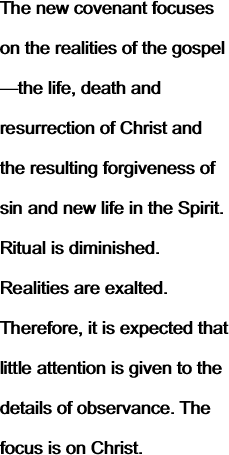 |
|
HOME | PROCLAMATION! MAGAZINE | DEVOTIONALS | STUDIES | LETTERS | ABOUT US | RELATED WEBSITES |
|
HOME / PROCLAMATION! MAGAZINE / 2008 / SEPTEMBER/OCTOBER / ASK THE PASTOR
SEPTEMBER / OCTOBER 2008
VOLUME 9, ISSUE 5
D E P A R T M E N T S
Ask the PASTOR
Is Sunday sacred?
Dale Ratzlaff
Question: What do you say to people who advocate Sunday "sacredness" or keeping Sunday as a measure of one's gratitude to God?
Answer: This is a good question, and the answer has many facets. Consider the following points:
It is necessary for Christians to have a planned time for corporate worship, instruction, celebration of the Lord's Supper, and fellowship.1 From its inception the Gentile church has chosen to meet on the first day of the week in honor of the resurrection.2
There is biblical support in the New Testament for giving special attention to the first day of the week. Jesus rose from the dead on Sunday morning.3 Every appearance of the risen Christ—when a time is mentioned—occurred on the first day of the week.4 (Notice especially John 20:19-23.)
There is biblical support in the Old Testament for giving special attention to the first day of the week—the day after the Sabbath5, or the "eighth day"6 which was associated with completion, worship, and freedom.
Unlike the Old Testament Sabbath, the first day of the week in the New Testament carries no baggage as to how it should be celebrated. The early church met on the first day of the week in honor of the resurrection,7 to celebrate the Lord's Supper, and to receive Christian instruction.8 However, little else is mentioned.
The new covenant focuses on the realities of the gospel—the life, death and resurrection of Christ and the resulting forgiveness of sin and new life in the Spirit.9 Ritual is diminished. Realities are exalted. Therefore, it is expected that little attention is given to the details of observance. The focus is on Christ.
Those who advocate the "sacredness" or the "keeping" of Sunday place themselves back under the dilemma of, "How?" Just how does one demonstrate his/her keeping? In what way does behavior correlate with sacredness? Who sets the guidelines? How does one know when he/she has kept Sunday appropriately? One well-known Sabbatarian theologian, after reviewing Sabbath in Christ, said it is important in this fast-paced world to have a day dedicated to rest. I responded in an email asking, "If I choose Sunday as my day of rest, would that meet this 'Sabbath requirement'?" He responded, "Yes."
It is no longer "1–6 for us; the 7th is for Jesus," but as Christ becomes our Sabbath rest, every day is for Jesus. This truth needs to be deeply impressed upon our minds and lived out in every aspect of our everyday lives. In every encounter with others we have an opportunity to be a reflection of Christ to them.10 In every activity of work we have an opportunity to do our work as unto the Lord.11 Living in the reality of the new covenant, our focus is no longer on our observance of rituals—no matter what the ritual may be—but on the realities of the gospel.
"But thanks be to God, who always leads us in triumph in Christ, and manifests through us the sweet aroma of the knowledge of Him in every place. For we are a fragrance of Christ to God among those who are being saved and among those who are perishing; to the one an aroma from death to death, to the other an aroma from life to life. And who is adequate for these things? For we are not like many, peddling the word of God, but as from sincerity, but as from God, we speak in Christ in the sight of God" (2 Cor. 2:14–17). †
Endnotes
- Heb. 11:23–25; Acts 2:23–27.
- Acts 20:7; 1 Cor. 16:2.
- Mt. 28:1; Mk. 16:2; Lk. 24:1.
- Mt. 28:1; Mk. 16:2, 9; Lk. 24:1; Jn. 20:1; Jn. 20:19.
- Lev. 23:11, 16.
- Ex. 22:30; Lev. 9:1, 12:3; 14:10, 23; 15:14; 15:29; 22:27; 23:36, 39; Num. 6:10; 7:54; 29:35; 1 Ki. 8:66; 2 Chron. 7:9; Neh. 8:18; Ez. 43:27.
- Often at dawn. See Walter A. Elwell, Evangelical Dictionary of Theology, p. 649, 650.
- At times the early church met at dawn and then reassembled later to have a meal of communion. Ibid. The Didache, an early manual of church instruction directed Christians to assemble on the Lord's day to worship, Ibid. p. 648.
- 1 Cor. 15:1–5; Rom. 15:16–19; 2 Tim. 2:8; Acts 2:38; 5:31; 10:43; 13:38; 26:18; Eph. 1:7; Col. 1:14.
- Rom. 12:10, 16; 13:8; 14:13; 15:5; Gal. 5:13; Eph. 4:2, 32; Phil. 2:8; 1 Thess. 5:11; Heb. 10:24.
- Col. 3:23
![]()
Copyright 2008 Life Assurance Ministries, Inc., Glendale, Arizona, USA. All rights reserved. Revised October 26, 2008. Contact email: proclamation@gmail.com




More answers can be found in Dale Ratzlaff's four books available on the web at LifeAssuranceMinistries.com or by phoning (800) 355-7073.